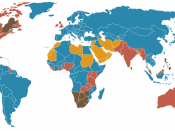Legal rights1.Legal Rights are the entitlements which can be claimed by a person in their interests as being enforced and recognised by the law, whether it be through common, constitutional, statute or international law, does not interfere with the rights society exercises2.Certain limitations must also be put into place, such as the law of trespass ensuring that others have their own right of privacy of their own land, the government also owes people certain legal rights needing to be enforced.
3.By giving legal recognition to a right, we prevent people from denying that the right exists, and ensure that processes are provided for effective enforcement.
4. Legal rights can be classified according to the level at which the law is able to enforce them, e.g., legal rights attaching property or personal liberty have been well protected by courts, e.g., the law of trespass is well recognised and enforceable5.
Other LR are harder to enforce as they are not as well known established by CL or parliament- e.g., freedom of expression is a LR, but has no statutory or common law backing in this country, may be classified as low-recognition right.
Moral Rights1.Moral Rights are interpreted as 'just' claims which humans are entitled to, in particular regarding the views of certain groups, such as via religious contexts, it would be seen as 'fundamentally' wrong to deny such a person this entitlement, whether with or without government enforcement.
2.This provides people with the ability to claim something without law, but allows for people to understand and not question it. For example, an individual who is opposed to war may claim that it is their 'moral right' to refuse to fight3.These moral rights may conflict with others in society or the laws of that society.
Customary Rights1.


